-- Exhibit–

-- Exhibit --
When Amanda tells Tom he can help his sister if he would "Overcome selfishness!" (line 53), to what selfishness is she referring?
-- Exhibit–
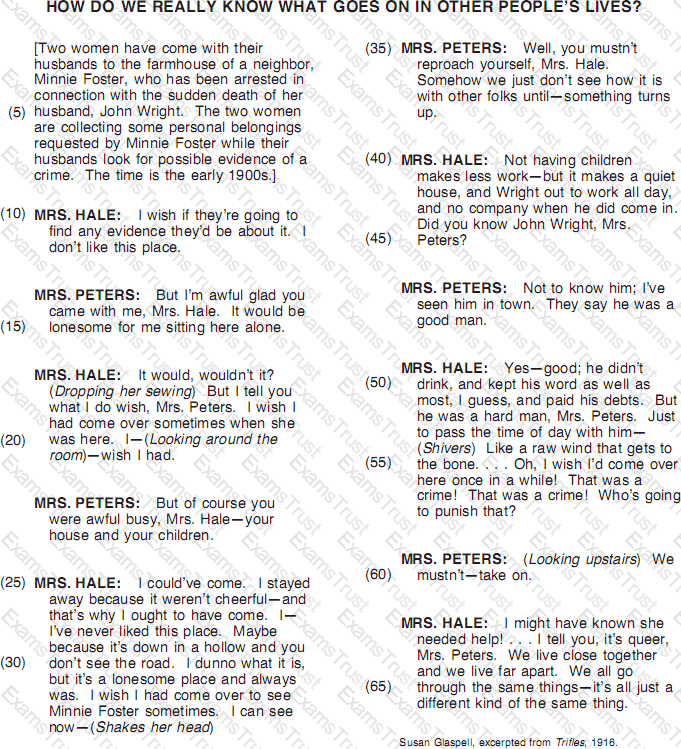
-- Exhibit --
Who is Mrs. Hale blaming when she says, “That was a crime! That was a crime” (lines 56–57)?
-- Exhibit–
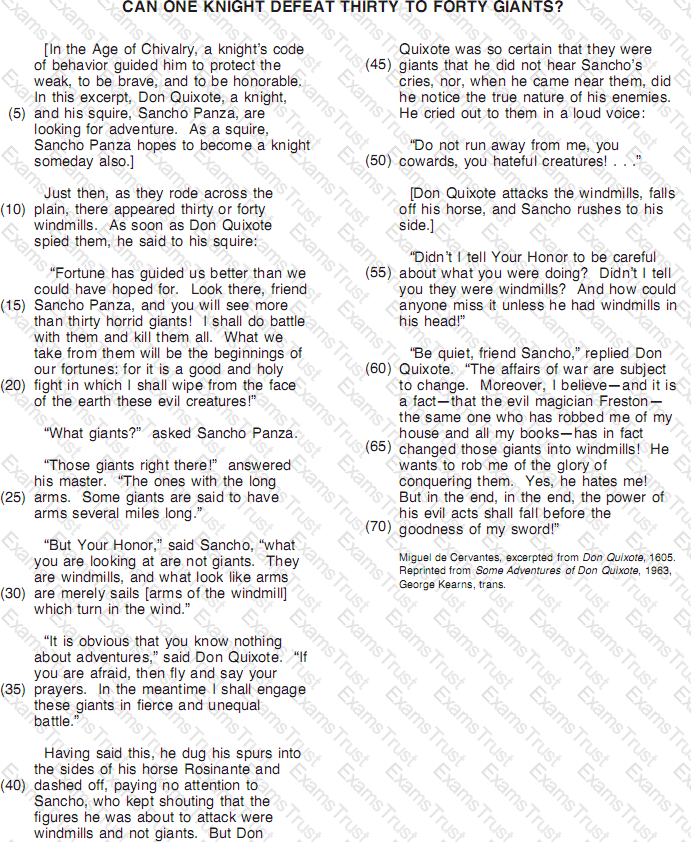
-- Exhibit --
What does Sancho Panza mean when he says that Don Quixote has “windmills in his head” (lines 57–58)?
-- Exhibit–
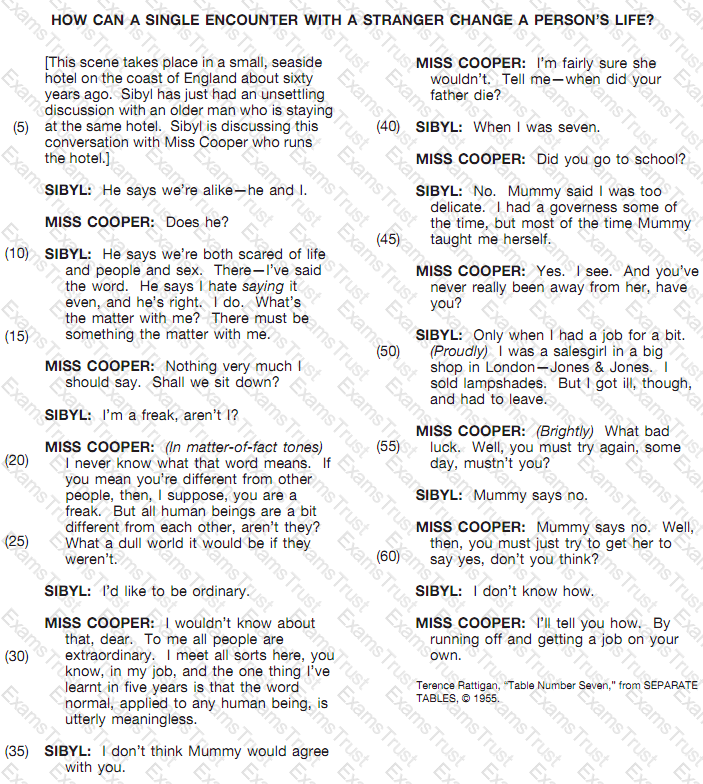
-- Exhibit --
Sibyl tells Miss Cooper that "Mummy says no" (line 57) to her getting another job. Why does Miss Cooper repeat these words aloud (line 58)?
-- Exhibit–

-- Exhibit --
Later in the story, Florence reunites with Gabriel, and they form a strong emotional bond. What does this additional information suggest about the family situation during the time described in this excerpt?
-- Exhibit–
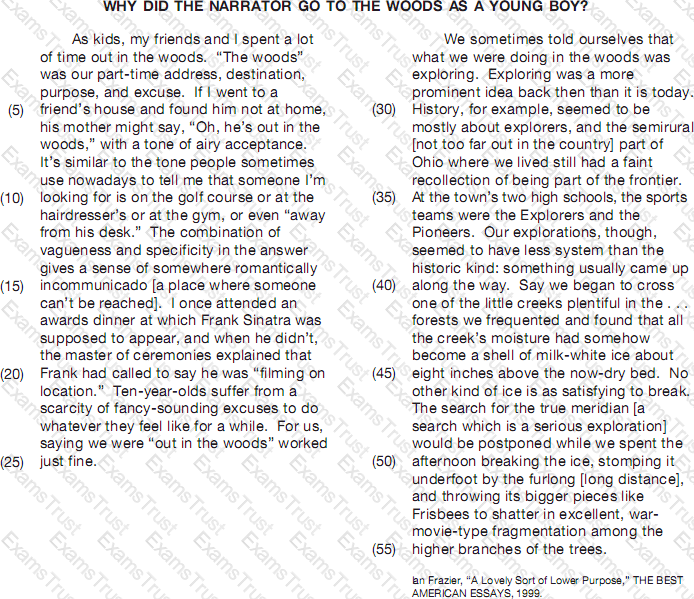
-- Exhibit --
What did the narrator and his friends like to pretend they were doing when they were out in the woods?
-- Exhibit–

-- Exhibit --
When Rose tells Sam that he is “different” from anybody she knows (lines 4–5), what is she acknowledging?
-- Exhibit–

-- Exhibit --
Which one of Berniece’s character traits is revealed when doaker says twice that "Berniece ain’t gonna sell that piano" (lines 10-11 and 16-17).
-- Exhibit–

-- Exhibit --
Later in the novel from which this excerpt is taken, Rozin leaves her family to nurse a former lover who is dying of cancer. Which detail from the excerpt suggests how Rozin feels about this decision?
-- Exhibit–

-- Exhibit --
Gerry Ellis was originally studying to become a “marine biologist” (line 2). What is a marine biologist?
-- Exhibit–
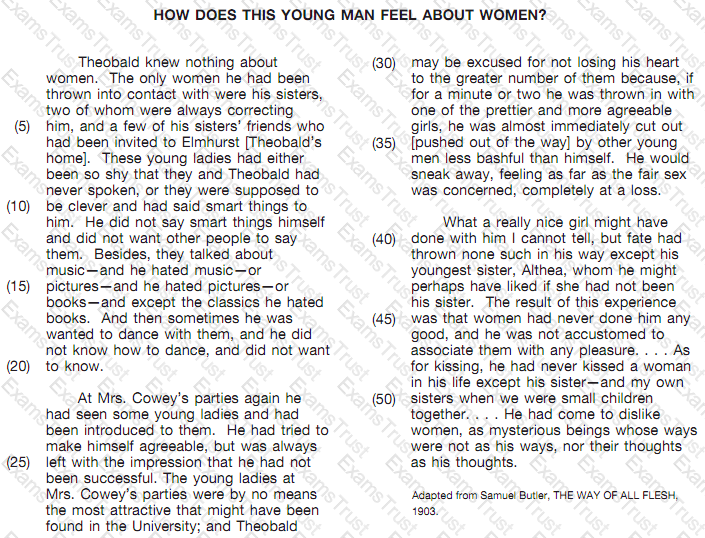
-- Exhibit --
At Mrs. Cowey’s parties, Theobald "was almost immediately cut out by other young men less bashful than himself" (lines 34–36) if he ever got near a pretty girl. What does this fact imply about his relationship with the other young men?
-- Exhibit–
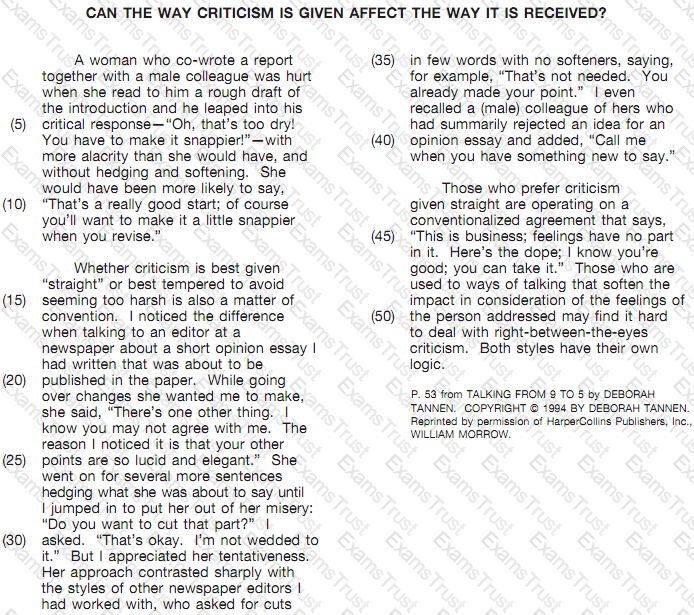
-- Exhibit --
On the basis of the passage, how would the author characterize the manner in which male and female editors offer criticism?
-- Exhibit–
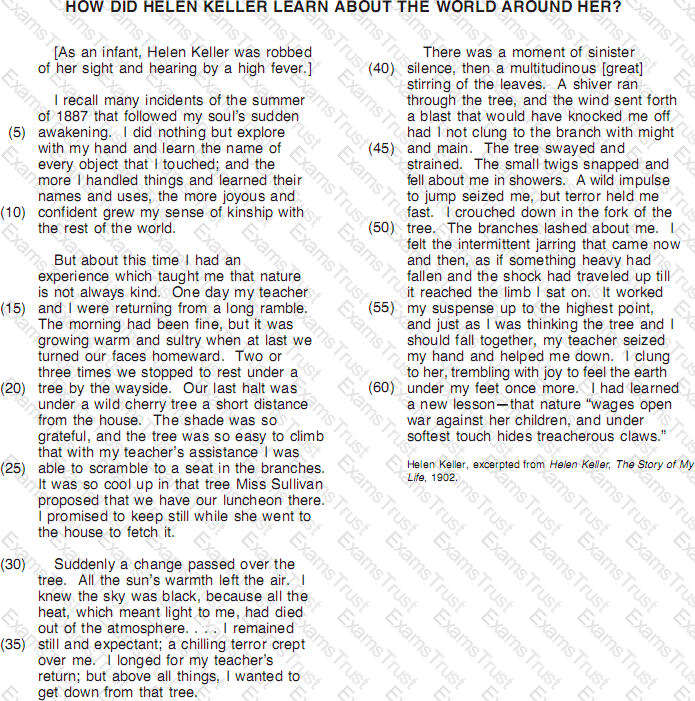
-- Exhibit --
How does Helen Keller characterize herself at the beginning of the excerpt?
-- Exhibit–

-- Exhibit --
Why does Mr. Jessup include the phrase “Where the pines meet the palms” (line 12) and put it in quotation marks?
-- Exhibit–

-- Exhibit --
What does Mr. Jessup mean when he says, “There are protected ocean areas for sailing, fishing, and water skiing” (lines 25–26)?
-- Exhibit–

-- Exhibit --
Nelson Mandela was the principal South African, anti-apartheid leader.
Based on the author’s description of Makeba in this excerpt, why was she able to return to South Africa after Mandela’s release from prison?
-- Exhibit–
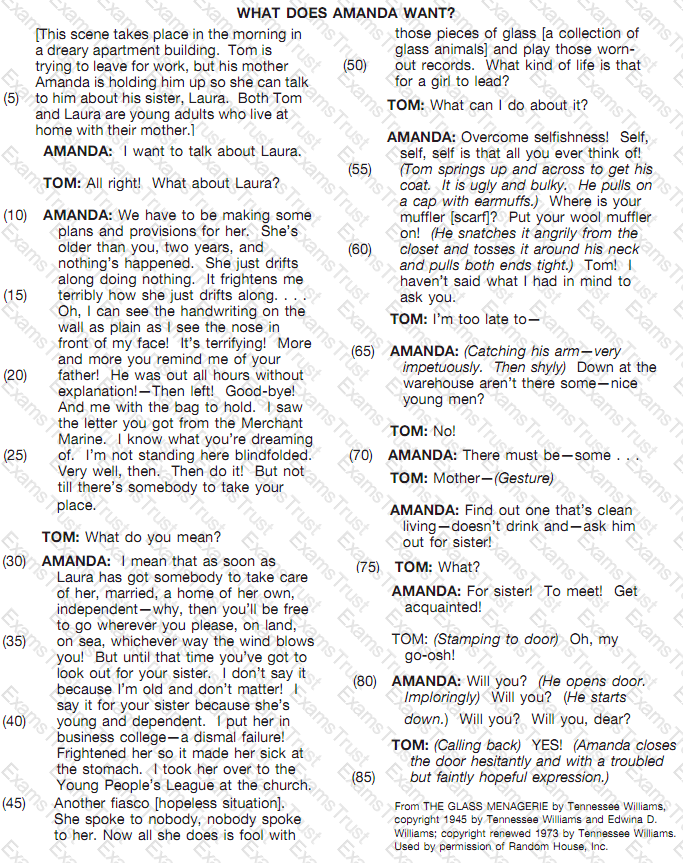
-- Exhibit --
Amanda is presented as a complex character. What conflicting desires for her children are evident in this passage?
-- Exhibit–
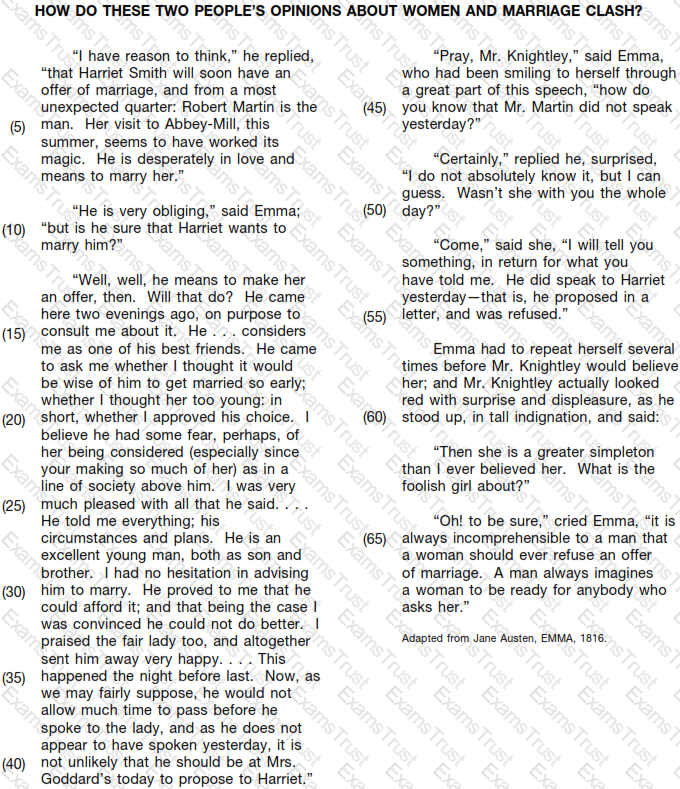
-- Exhibit --
Why does Mr. Knightley call Harriet a "simpleton" (line 61)?
-- Exhibit–
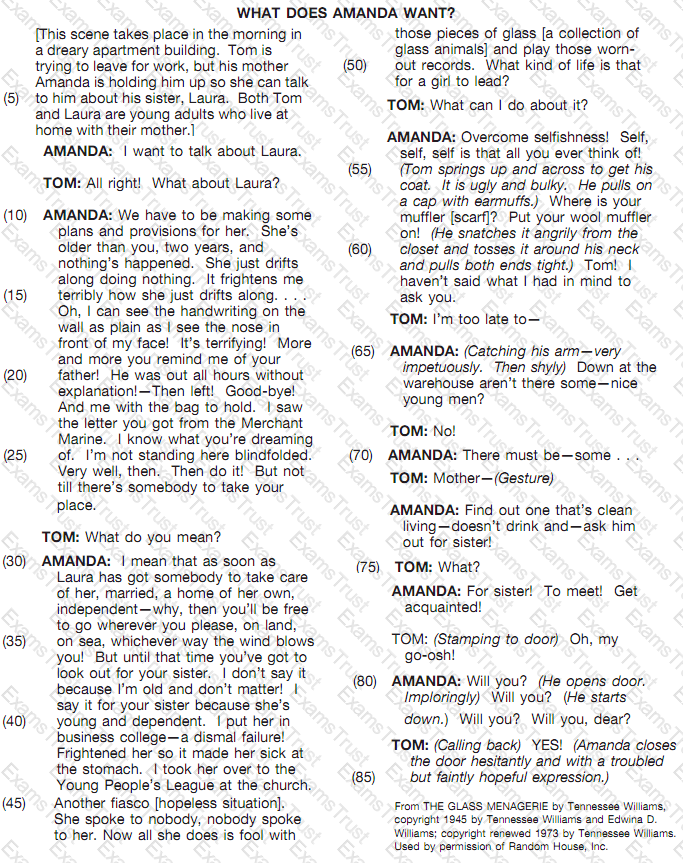
-- Exhibit --
Based on the qualities of Laura as seen in this excerpt, which of the following jobs would she be most likely to enjoy?
-- Exhibit–

-- Exhibit --
The narrator describes how the heavy snow will break some trees and how the more flexible trees will bend with the weather (lines 10–11).
What might the trees in this excerpt symbolize?
-- Exhibit–

-- Exhibit --
What is suggested about Engel’s attitude toward coyotes by his statement, "I began to marvel at these uninvited guests. Why, I wondered, is the coyote so successful, despite persistent attempts by people to eradicate it" (lines 63–67)?
-- Exhibit–
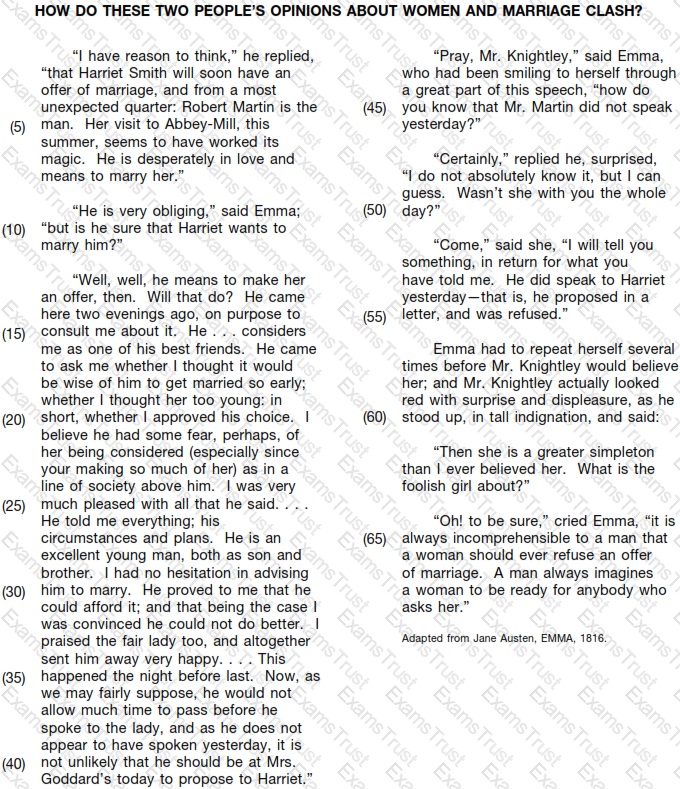
-- Exhibit --
Which one of the following phrases best describes Emma’s character as revealed in this excerpt?
-- Exhibit–
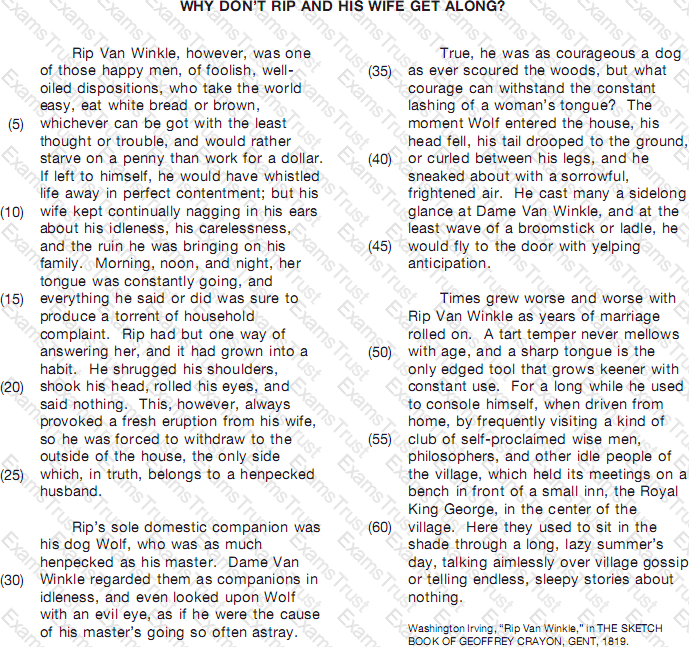
-- Exhibit --
Which phrase best describes Rip Van Winkle’s attitude toward earning a living?
-- Exhibit–
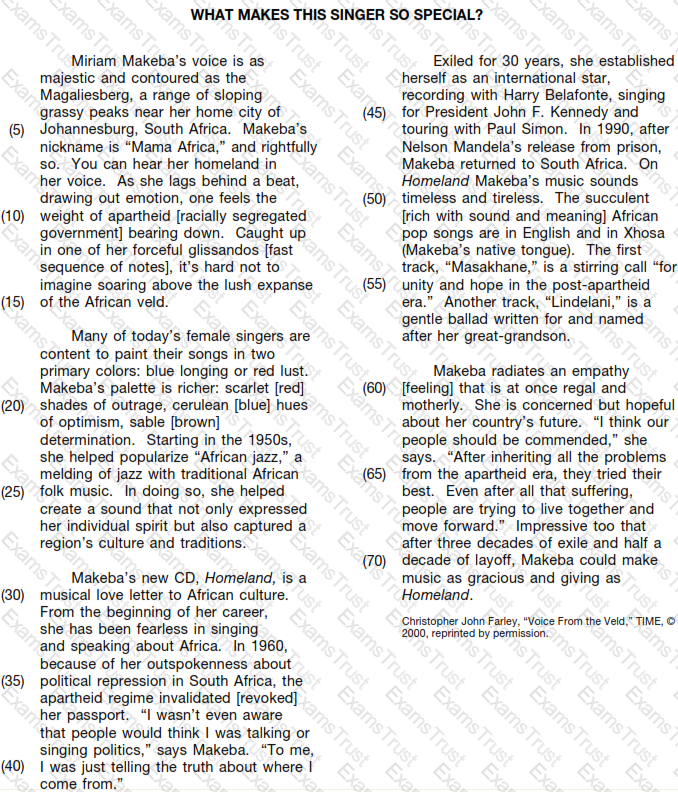
-- Exhibit --
Why is "Mama Africa" an appropriate nickname for Makeba?
-- Exhibit–
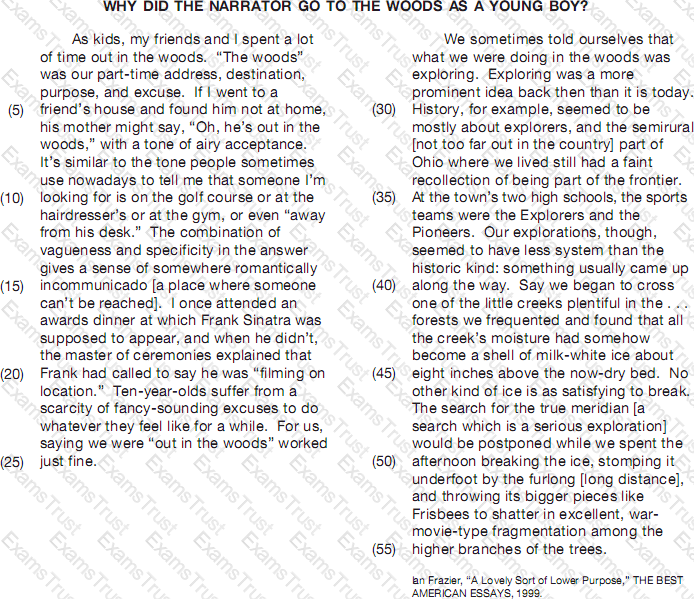
-- Exhibit --
What did the narrator and his friends like the most about throwing ice when the narrator says that the ice would “shatter in excellent, war-movie-type fragmentation” (lines 53–54)?
Exhibit:
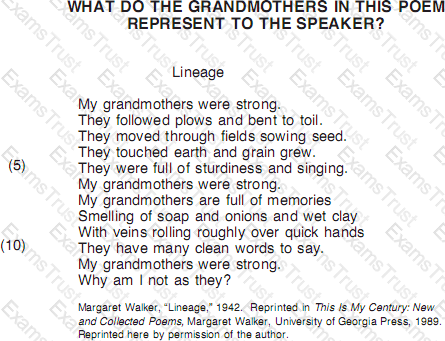
What does the speaker of the poem reveal in the final line, “Why am I not as they?”
-- Exhibit–
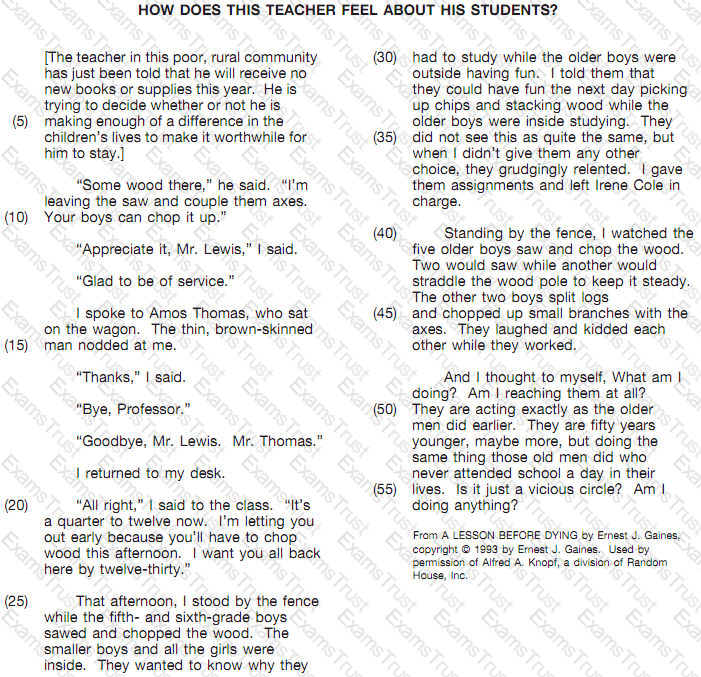
-- Exhibit --
Based on the excerpt, what quality does this teacher possess that might be important for his success with his students?
-- Exhibit–
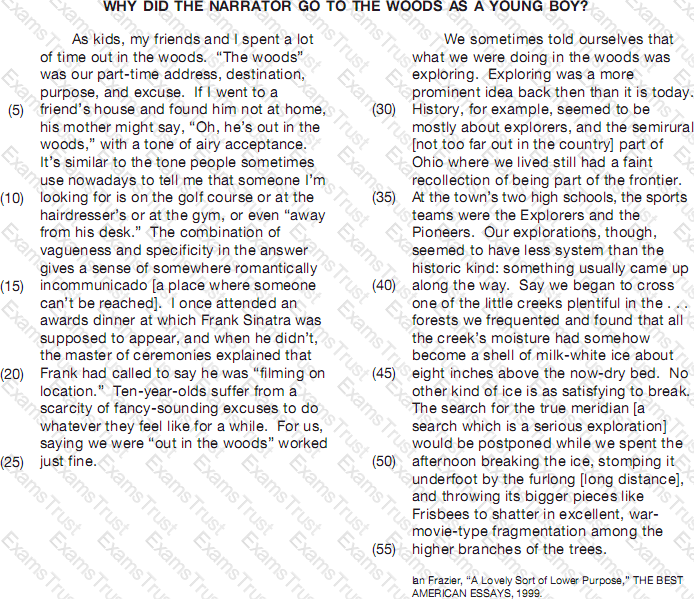
-- Exhibit --
This excerpt is from an essay titled, “A Lovely Sort of Lower Purpose.” Based on the title and the example described in this excerpt, what is a “lower purpose”?
Exhibit:

If the grandmothers described in the poem suddenly faced a grave economic problem, which one of the following would they be most likely to do?
-- Exhibit–
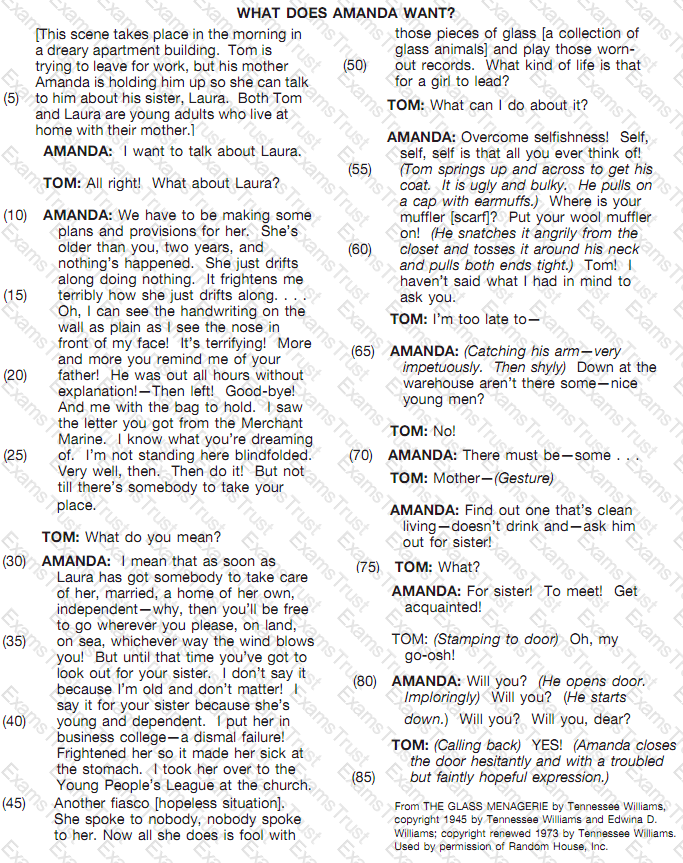
-- Exhibit --
When Amanda says, "I can see the handwriting on the wall . . . It’s terrifying!" (lines 16–18), what does she mean?
-- Exhibit–

-- Exhibit --
Later in the story, Ichabod is humiliated by another young man who scares Ichabod away by pretending to be a headless horseman.
Based on Ichabod’s character as revealed in the excerpt, what probably causes him to run away even when he realizes that the headless horseman isn’t a real ghost?
-- Exhibit–
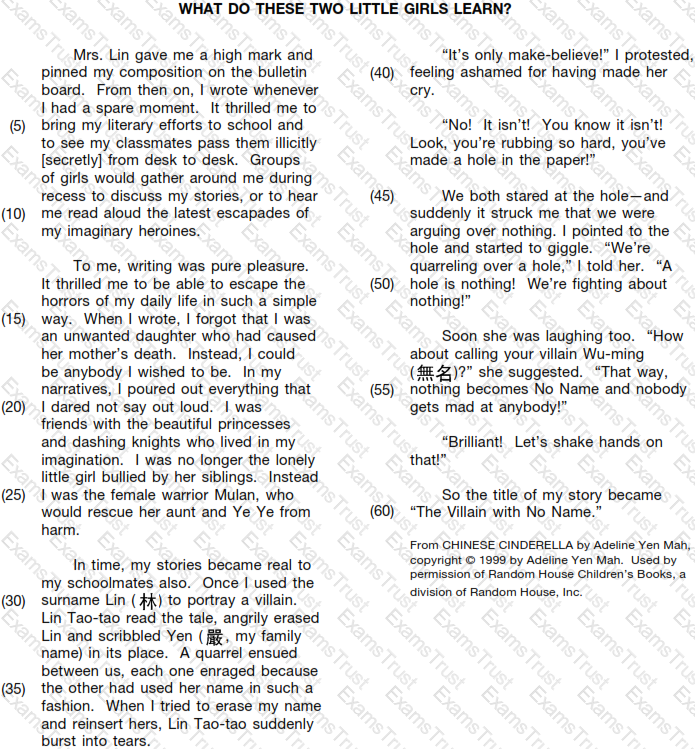
-- Exhibit --
Suppose that as an adult, the narrator had a niece who didn’t like school. Based on the way the narrator handles her family problem in this excerpt, what advice would the narrator probably give to her niece about handling the problem at school?
-- Exhibit–
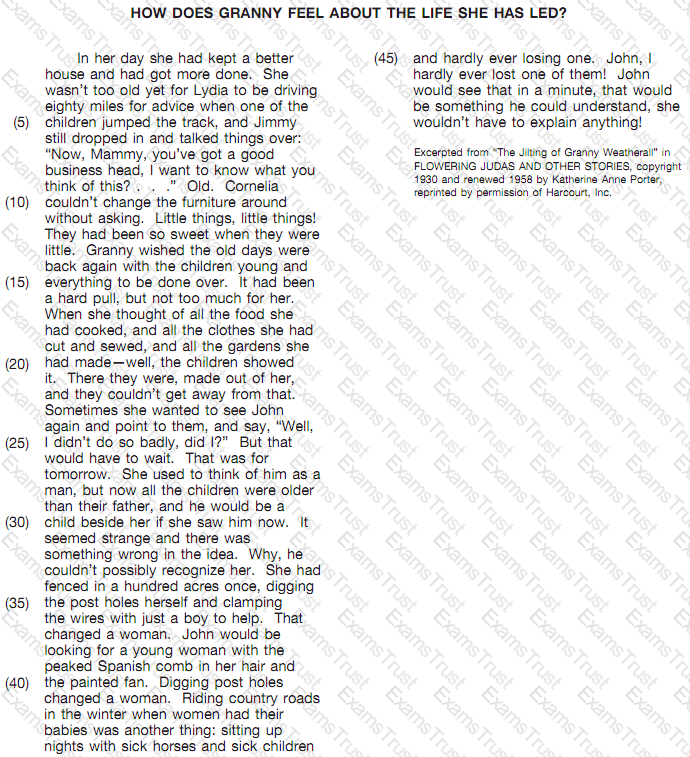
-- Exhibit --
One critic wrote of this author that "some of her [the author’s] stories . . . deal with the crises of individuals who must cope with the disappearance of order."
Based on the information in this excerpt, how does Granny’s life support this critic’s observations?
-- Exhibit–
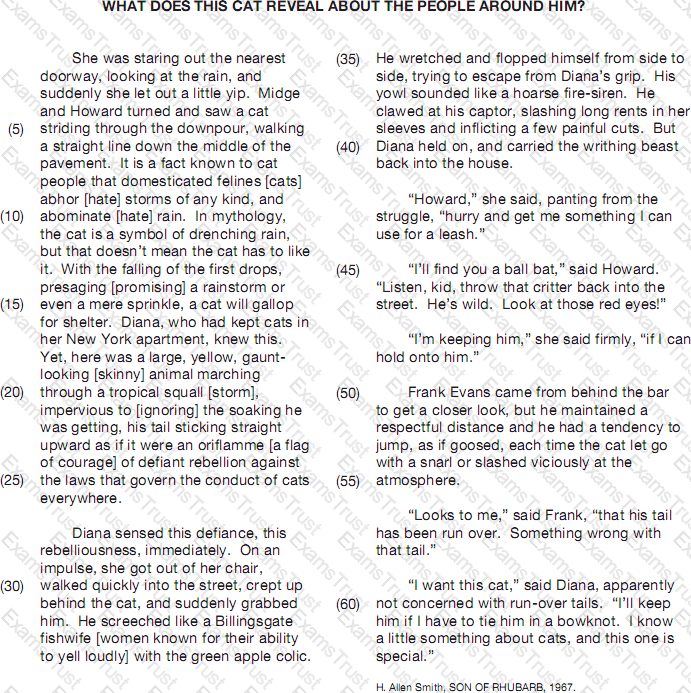
-- Exhibit --
When Diana asks for a leash, Howard says he’ll get her a baseball bat. What is Howard’s opinion of what Diana should do with the cat she catches?
-- Exhibit–

-- Exhibit --
In “How To Eat a Poem,” the author Eve Merriam writes,
Don’t be polite.
Bite in.
Pick it up with your fingers and lick the juicethat may run down your chin.How is the advice offered in the two poems alike?
-- Exhibit–
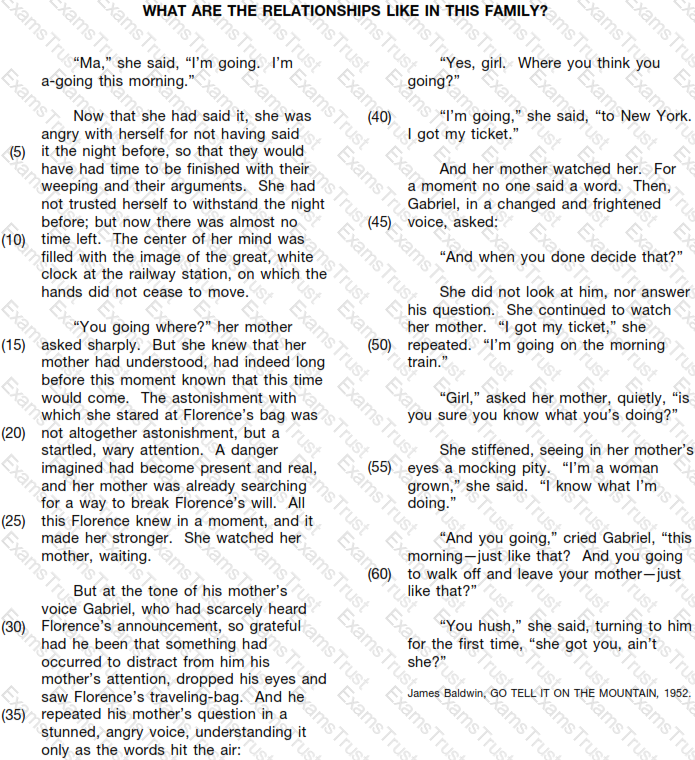
-- Exhibit --
After Florence told Ma she was leaving, "The center of her mind was filled with the image of the great, white clock at the railway station, on which the hands did not cease to move" (lines 10–13).
What was Florence thinking about after she told Ma her plans?